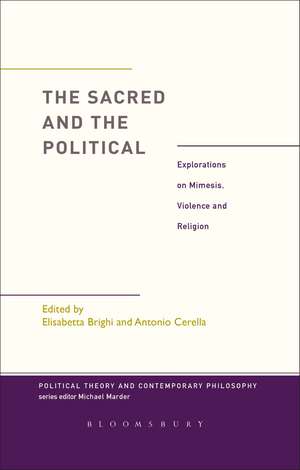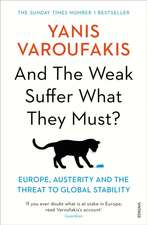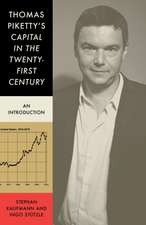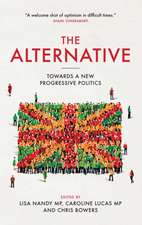The Sacred and the Political: Explorations on Mimesis, Violence and Religion: Political Theory and Contemporary Philosophy
Editat de Dr. Elisabetta Brighi, Dr. Antonio Cerellaen Limba Engleză Hardback – 27 iul 2016
Din seria Political Theory and Contemporary Philosophy
- 14%
 Preț: 192.73 lei
Preț: 192.73 lei - 23%
 Preț: 191.13 lei
Preț: 191.13 lei - 30%
 Preț: 540.80 lei
Preț: 540.80 lei - 13%
 Preț: 239.59 lei
Preț: 239.59 lei -
 Preț: 190.96 lei
Preț: 190.96 lei - 13%
 Preț: 237.75 lei
Preț: 237.75 lei - 13%
 Preț: 257.50 lei
Preț: 257.50 lei - 22%
 Preț: 256.29 lei
Preț: 256.29 lei - 22%
 Preț: 258.77 lei
Preț: 258.77 lei - 23%
 Preț: 178.36 lei
Preț: 178.36 lei -
 Preț: 239.59 lei
Preț: 239.59 lei - 14%
 Preț: 191.13 lei
Preț: 191.13 lei - 13%
 Preț: 257.41 lei
Preț: 257.41 lei - 22%
 Preț: 225.12 lei
Preț: 225.12 lei - 23%
 Preț: 222.84 lei
Preț: 222.84 lei - 21%
 Preț: 217.62 lei
Preț: 217.62 lei - 24%
 Preț: 188.01 lei
Preț: 188.01 lei - 30%
 Preț: 510.34 lei
Preț: 510.34 lei - 30%
 Preț: 511.81 lei
Preț: 511.81 lei
Preț: 774.20 lei
Preț vechi: 1113.16 lei
-30% Nou
Puncte Express: 1161
Preț estimativ în valută:
148.16€ • 160.88$ • 124.45£
148.16€ • 160.88$ • 124.45£
Carte tipărită la comandă
Livrare economică 22 aprilie-06 mai
Preluare comenzi: 021 569.72.76
Specificații
ISBN-13: 9781628925968
ISBN-10: 1628925965
Pagini: 288
Dimensiuni: 152 x 229 x 24 mm
Greutate: 0.54 kg
Editura: Bloomsbury Publishing
Colecția Bloomsbury Academic
Seria Political Theory and Contemporary Philosophy
Locul publicării:New York, United States
ISBN-10: 1628925965
Pagini: 288
Dimensiuni: 152 x 229 x 24 mm
Greutate: 0.54 kg
Editura: Bloomsbury Publishing
Colecția Bloomsbury Academic
Seria Political Theory and Contemporary Philosophy
Locul publicării:New York, United States
Caracteristici
Makes a contribution to a timely, cutting edge debate whose relevance is global and on the rise, but whose investigation is still underdeveloped
Notă biografică
Elisabetta Brighi is a Lecturer in International Relations at the Department of Politics and International Relations, University of Westminster. She is the author of Foreign Policy, Domestic Politics and International Relations (2013) and Pragmatism in International Relations (2009), co-edited with Harry Bauer.Antonio Ceralla is a Lecturer in International Relations at the University of Central Lancashire, UK. His recent publications include: 'Religion and political form: Carl Schmitt's genealogy of politics as critique of Jürgen Habermas's postsecular discourse', Review of International Studies; 'Terrorismo: Storia e Analisi di un concetto' (2009); 'Forme della violenza nel sistema contemporaneo' (2010). He is currently co-editing and contributing to the Special Issue of the Journal of International Political Theory on 'Mimetic Theory and International Studies'.
Cuprins
Introduction: The Power of Sacrifice: René Girard and the Political Antonio Cerella (University of Central Lancashire)Chapter 1. Aristotle on Mimesis and Violence: Things Hidden since the Foundation of Literary TheoryArata Takeda (University of Chicago & Free University of Berlin)Chapter 2. René Girard and Thomas Aquinas on Prophecy and the Purging of the Notion of JusticePaul M. Rogers (University of Cambridge)Chapter 3. Unlikely Twins? Machiavelli and Girard on Violence, Crisis and the Origins of the StateErnesto Gallo (The Open University, UK)Chapter 4. René Girard, Human Nature and Political ConflictKent Enns (Humber College, Toronto, Canada)Chapter 5. Spinoza, Girard and the Possibility of a Purely Immanent DemocracyStéphane Vinolo (Regent's University of London)Chapter 6. René Girard's Mimetic Theory: An 'Anti-Political Theology'?Michael Kirwan (Heythrop College, University of London)Chapter 7. A 'Theoretical Double': Violence, Religion and Social Order in Schmitt and GirardAndrea Salvatore (University of Rome - La Sapienza)Chapter 8. Mimesis and Sartre's Critique of Dialectical ReasonPaul Dumouchel (Ritsumeikan University, Kyoto, Japan)Chapter 9. The Sacred and the Secular: René Girard and Gianni Vattimo on Modernity and Violence Pierpaolo Antonello (University of Cambridge)Chapter 10. The Myth of Origin: Archaeology and History in the Work of Agamben and Girard Antonio Cerella (University of Central Lancashire)Chapter 11. The Age of Panic. On Mimetic Post-ModernityEmanuele Antonelli (University of Turin) Index
Recenzii
Why is politics so closely tied to death and destruction, and why is religion so often the midwife of sacrifice and ritual murder? This book addresses these questions, relying chiefly on the insights of René Girard's mimetic theory, Carl Schmitt's reflections on sovereignty, and Giorgio Agamben's notion of "homo sacer". Bringing together a remarkable collection of essays written by leading experts, the book ends appropriately with a chapter devoted to the present time defined as "mimetic post-modernity or "the age of panic".
It is a rare event for such a startling and original collection of essays to appear. Drawing in various ways on René Girard's profound meditations on the deeper well-springs of our civilisation, this book reflects not just the work of a man but also the world that he represented and created. The European imagination has always been torn between the sacred and the profane, between the profundity of sacrifice and the violence of victimhood. This is reflected in modern forms of political sovereignty, which imbues both the body and the body politic with a dynamic of repressed and expressed violence, the management of which is the essence of contemporary statecraft. This brilliant collection of articles represent a profound meditation on fundamental questions of our times and therefore illuminates the enduring amalgam of the sacred and the political in all times.
.The Sacred and the Political is an excellent and timely collection, putting Girard's mimetic theory into dialogue with some of the most prominent Western political philosophers, ancient and contemporary. The value of this volume is that it fills a gap in Girardian scholarship by further developing Girard's theory in politically relevant ways.
It is a rare event for such a startling and original collection of essays to appear. Drawing in various ways on René Girard's profound meditations on the deeper well-springs of our civilisation, this book reflects not just the work of a man but also the world that he represented and created. The European imagination has always been torn between the sacred and the profane, between the profundity of sacrifice and the violence of victimhood. This is reflected in modern forms of political sovereignty, which imbues both the body and the body politic with a dynamic of repressed and expressed violence, the management of which is the essence of contemporary statecraft. This brilliant collection of articles represent a profound meditation on fundamental questions of our times and therefore illuminates the enduring amalgam of the sacred and the political in all times.
.The Sacred and the Political is an excellent and timely collection, putting Girard's mimetic theory into dialogue with some of the most prominent Western political philosophers, ancient and contemporary. The value of this volume is that it fills a gap in Girardian scholarship by further developing Girard's theory in politically relevant ways.







